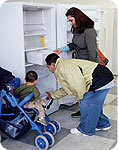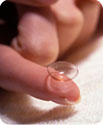|
||||||||||||||||||||||||||||
|
|
|
|
| Product Safety Recalls | |
Recalls may get products off store shelves but it is more difficult to get them out of people’s homes when they are resold at garage sales, discount or “dollar” stores, swap meets and on the Internet. Many recalled children’s products are resold in online auction sites, often years after they were deemed dangerous. Even experienced and reputable sellers, may not know a product has been recalled. And it is difficult for online bidders to check for a recalled product since many listings do not include a serial number or manufacturer date. Use the resources below from the CPSC to thoroughly check out a product before you sell or buy. Finding information on recalled consumer products
Reporting a problem with a product to the CPSC To report an unsafe consumer product or a product-related injury or find product information, contact the Consumer Product Safety Commission online or call the CPSC toll-free hotline at 800-638-2772 (English/Spanish) or 800-638-8270 for the hearing and speech impaired. Food Products
Some of the food products the Food and Drug Administration (FDA) regulates include:
Some of the products the Food Safety and Inspection Service (FSIS) regulates include:
Finding information on food-related recalls For non-meat products:
For products containing meat:
Reporting a problem with a food product For non-meat products:
For products containing meat:
For assistance with restaurant food problems:
|
Health Products
Although medical products are required to be safe, safe does not mean zero risk. A safe biological product is one that has reasonable risks, given the patient's condition, the magnitude of the benefit expected, and the alternatives available. The choice to use a biological product involves balancing the benefits to be gained with the potential risks. Some of the medical products the Food and Drug Administration (FDA) regulates include:
Medical Devices These are only some of the products FDA’s Center for Devices and Radiological Health (CDRH) regulates - contact lenses, hearing aids, blood glucose strips and meters, breast pumps and many more devices. A medical device recall occurs when a device is defective, when it could be a risk to health, or when it is both defective and a risk to health. A medical device recall does not always mean that you must stop using the product or return it to the company. A recall sometimes means that the device needs to be checked, adjusted, or fixed. Examples of the types of actions that may be considered recalls: inspecting the device for problems, repairing the device, re-labeling, adjusting settings on the device, or destroying the product. In most cases, a company recalls a medical device on its own, but the Food and Drug Administration can as well. The FDA classifies recalls into three categories, representing the potential risk to public health: Class I (high risk), Class II (less serious risk), and Class III (low risk). Finding information on medical device related recalls
Reporting a problem with a medical device to CDRH
Biologics, Blood and Vaccines
Blood Vaccines Finding information on related product recalls
Note: If you have questions or are unable to find the information you need, consumers can contact: Center for Biologics Evaluation and Research, Office of Communication, Training & Manufacturers Assistance at 800-835-4709 or 301-827-1800, or email octma@cber.fda.gov. Reporting a problem with a product to CBER
Cosmetics
FDA’s Center for Food Safety and Applied Nutrition (CFSAN) is the federal agency that regulates cosmetic products. Federal regulations prohibit the marketing of adulterated or misbranded cosmetics. Improperly labeled or deceptively packaged products are considered misbranded and subject to regulatory action. FDA has no authority to order a recall of a cosmetic, although it can request that a firm recall a product. Some of the cosmetic-related products CFSAN (FDA) regulates include:
A cosmetic is adulterated if:
A cosmetic is considered misbranded if:
Finding information on cosmetic product recalls
Reporting a problem with a cosmetic product
|
Animal Products
Some of the animal products CVM regulates include:
Pet Foods The CVM regulates that can of cat food, bag of dog food, or box of dog treats or snacks in your pantry. The regulation of pet food is similar to that for other animal feeds. The law requires that pet foods, like human foods, be pure and wholesome, safe to eat, produced under sanitary conditions, contain no harmful substances, and be truthfully labeled. Animal Feed, Feed Ingredients, and Additives A safe animal feed supply helps ensure healthy animals and people. To that end, CVM monitors and establishes standards for feed contaminants, approves safe food additives, and manages medicated feed and pet food programs. Finding information on animal products recalls
Reporting a problem with an animal product
|
Other ResourcesThis is just a brief overview. For more information, check out these resources: Read these publications online or order them from FCIC: Websites*
* Names of resources and organizations included in this online article are provided as examples only, and their inclusion does not mean that they are endorsed by the Federal Citizen Information Center or any other Government agency. Also, if a particular resource or organization is not mentioned, this does not mean or imply that it is unsatisfactory. *If you click on these links, you are leaving FCIC's website. Please bookmark us before you leave so you can return easily. FCIC is not responsible for the content of these websites.
|
|
We will not retain or use this information for any other purpose.
|
For more information on other popular consumer issues check out FCIC's Consumer Focus Archive. | ||||||||||||||||||||||||||||||||||||||||||||||
|
|
||
| Important Notices - Site Map | ||
|
|
||
| This service is provided by the Federal Citizen Information Center of the U.S. General Services Administration. E-mail us your comments or questions. |
|
|

 On March 15, 2007 the American public first heard about a massive pet food recall. In August 2007 over 9 million toys were recalled due to a lead poisoning hazard. And both of these recalls grew over several weeks to include additional products. Fortunately these dangerous products made the news, and consumers knew to dispose of these harmful items.
On March 15, 2007 the American public first heard about a massive pet food recall. In August 2007 over 9 million toys were recalled due to a lead poisoning hazard. And both of these recalls grew over several weeks to include additional products. Fortunately these dangerous products made the news, and consumers knew to dispose of these harmful items. Consumer Goods
Consumer Goods Separate government agencies are responsible for protecting different segments of the food supply. If you have experienced a problem with a food product, be sure to contact the appropriate agency.
Separate government agencies are responsible for protecting different segments of the food supply. If you have experienced a problem with a food product, be sure to contact the appropriate agency. This category includes a wide variety of products – all of which can be regulated by several federal agencies.
This category includes a wide variety of products – all of which can be regulated by several federal agencies. FDA’s
FDA’s  FDA defines cosmetics as "articles intended to be rubbed, poured, sprinkled, or sprayed on, introduced into, or otherwise applied to the human body...for cleansing, beautifying, promoting attractiveness, or altering the appearance.” Among the products included in this definition are skin moisturizers, perfumes, lipsticks, fingernail polishes, eye and facial makeup preparations, shampoos, permanent waves, hair colors, and deodorants, as well as any material intended for use as a component of a cosmetic product.
FDA defines cosmetics as "articles intended to be rubbed, poured, sprinkled, or sprayed on, introduced into, or otherwise applied to the human body...for cleansing, beautifying, promoting attractiveness, or altering the appearance.” Among the products included in this definition are skin moisturizers, perfumes, lipsticks, fingernail polishes, eye and facial makeup preparations, shampoos, permanent waves, hair colors, and deodorants, as well as any material intended for use as a component of a cosmetic product. The
The